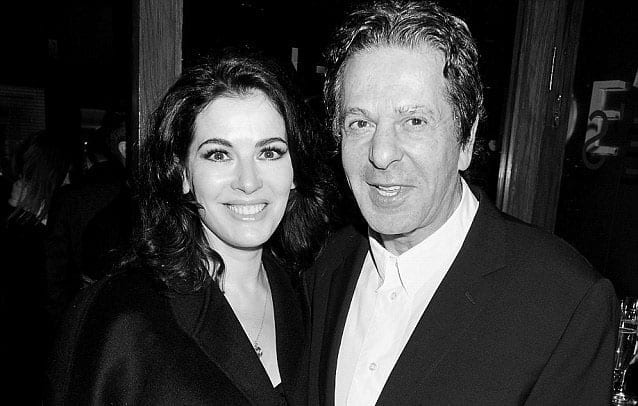My heart breaks for Nigella Lawson.
As most people with a TV, newspaper, or Internet access know, three weeks ago London bystanders captured pictures of the celebrity chef, author, and mother of two sitting on an outdoor restaurant patio, being choked by her uber-wealthy husband Charles Saatchi, co-founder of one of the world’s most successful advertising agencies.
Lawson has since said nothing publicly. She has reportedly left the family home with her two children from a previous marriage, Cosima, 19, and Bruno, 17. Lawson, despite her wealth, beauty, and celebrity, is not alone: one-third of women report having been assaulted by a partner. Having been choked, held hostage, and beaten by my own husband, I can somewhat too vividly imagine the fear, denial, shame and confusion she must be experiencing right now.
Nigella Lawson’s husband, on the other hand, has been quite public. And crystal clear that none of these shenanigans are his fault, and none of it is serious. His mindset is far harder for me to comprehend.
First Charles Saatchi told The Evening Standard that he grabbed his wife’s throat during an argument, for “emphasis.” He also described the fight as a “playful tiff.” He said Nigella was crying because of their discussion, not because he had strangled her. Then he visited the London police and accepted a “caution” for assault, as if he had committed a minor crime such as littering or jaywalking.
I would like to make a few points here.
First of all, no matter how angry I have been in my life, whether at my husband, my parents, my siblings, or my children, I have never, ever grabbed another human being’s throat. For “emphasis” or for any other reason. Not in public. Not behind closed doors. I have screamed, cried, thrown small pieces of furniture, and pulled my car off the road when angry.
But choke another person? No.
Choking someone, under any circumstances, is an act of animalistic rage, not to be underestimated in its lethality. Which is why Johns Hopkins University, in its research-based assessment of the potential danger of abusive relationships, classifies choking right up there with gun ownership in terms of red flags. It only takes a few seconds to kill a person by strangling them. When someone is enraged, a few seconds can pass without the person being able to control him or herself. (If you want to take a quick 20-question survey to gauge how dangerous a relationship may be, the One Love Foundation website offers a free, anonymous app based on the Johns Hopkins data.)
Second, therapists and social workers who run groups for abusive partners agree that two criteria are predictors of recovery for perpetrators: accepting full responsibility for the violence (eg, admitting the victim did not cause or provoke the violence) and going public with this personal responsibility (“it was my fault, and I’m never going to do it again.”) Charles Saatchi’s media statements capture the opposite of this mindset, suggesting denial is running full throttle for him.
Third: Why did no one intervene during the fight? Instead of using their cell phone to take pictures of the couple, why didn’t anyone call the police? Relationship violence is against the law. When we suspect it, or see it firsthand, we have a community responsibility to report it, just as we would if we witnessed a car crash. The only way to stop domestic violence is to recognize its signs, shine a spotlight on violent behavior, and treat DV as the crime it is.
Lastly, and perhaps most painfully, is the hard road Nigella Lawson has before her. It takes victims an average of seven attempts to leave an abuser. Too often when they do, family court judges grant unsupervised visitation rights to the abuser, despite the fact that 50% of people who abuse their partners admit to physically abusing their children. Additionally, abusers, who at times view victims as their property, often continue to terrorize their ex-partners (and their children) by denying the abuse, vilifying the victim, withholding financial support, stalking, and by using the divorce courts to antagonize and punish partners who have left them. Most disturbingly, 70% of domestic violence murders happen after the victim ends the relationship, because then the abuser feels they have nothing left to lose by killing the object of their obsession.
One of the main reasons I was able to leave my physically abusive husband was that we had no children together and virtually zero financial assets. It was a relatively clean split (although I did have to pay him a lump sum in our divorce – painful to do, but money well spent). I haven’t heard from him in over 20 years.
Lawson is not so lucky.
The only good news in this tragedy is the public outrage over the attack. Clearly we’ve got Nigella Lawson’s back, based on the media coverage and outrage over Charles Saatchi’s behavior. By continuing to lend public support to Lawson and other relationship violence victims, we can assure victims that when they do have the courage to leave an abuser, their communities will support and shelter them.





